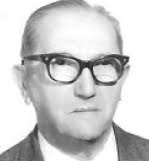Albert Korodi
He began his university studies at the Faculty of Mechanical Engineering of the Budapest University of Technology (BME) in 1906, and then graduated as an electrical engineer from the Technical University of Berlin-Charlottenburg. While still a student, he became an assistant in the laboratory of the Department of Theoretical Electrical Engineering. During his studies, he developed a close friendship with Leó Szilárd, with whom he often talked about their work.
In 1921, after obtaining his electrical engineering degree, he first worked in a Berlin machine factory and then for a year in a research institute, where he dealt with measurements in high-voltage electric fields. Here he met again Dénes Gábor, with whom he had become friends at Markó Street Gymnasium, and who had developed a method for measuring transients in high-voltage networks.
In 1922, at the invitation of Leó Szilárd, he moved to the AEG Research Institute (Allgemeine Elektricitäts-Gesellschaft), where he was assigned to lead a group to develop a refrigerator operating by electrodynamic pumping of liquid metal. In this context, he met Albert Einstein in 1928, who significantly contributed to the patenting of this type of refrigerator (which, however, never materialized).
He returned to Hungary in 1933. He was unemployed for a year, then worked at the Vatea company on the implementation of a measuring amplifier that was the subject of his patent; however, he stopped working as soon as he learned that it had already been implemented in America. In 1934, he got a job at the Hungarian Philips radio factory. He learned this profession from Philips publications and other technical literature. To do this, he also learned Dutch in addition to his knowledge of English, German and French. From 1936 to 1938, his task was to organize and lead a group dealing with the quality control of radio devices; from 1938, the production of the devices began, when he became chief designer and head of the laboratory, until 1950.
In 1950, he became a senior scientific associate and group leader of the then-established Telecommunications Research Institute (TKI). At this institute, he was entrusted with numerous military technical tasks, about which public announcements were not allowed. He primarily worked on problems related to research into microwave radio communications. As a pensioner, he was a scientific advisor to TKI between 1968 and 1978.
He was one of the first to deal with information theory in Hungary. He gave lectures at the Institute of Advanced Engineering, at TKI seminars and at evening university. He is the author of the first college notes in the literature (Introduction to Information Theory, 1954).
Many of his writings were published in non-public internal publications. His scientific activities are still unexplored (2016 publication). He initiated several young colleagues on the path of scientific research. He supervised the development of scientific dissertations and participated in the criticism of dissertations.
For decades, he was a member of scientific associations, such as the Eötvös Loránd Physical Society, the Hungarian Society of Physics, and the Hungarian Society of Telecommunications (HTE).
Even in his retirement years, he tried to keep up with the development of technology. For many years, he reported on the two most important journals of the Institute of Electrical and Electronics Engineers (IEEE), IEEE Spectrum and IEEE Proceedings, for the National Technical Information Center and Library (OMIKK).
In 1993, HTE awarded him the association's highest honor, the Tivadar Puskás Award.
- In 1916 he graduated from the Markó Street High School, where his mathematics teachers were Károly Fröhlich and György Pólya. That same year (then still under the name Kornfeld) he won first prize at the 23rd National Eötvös Loránd Mathematics Student Competition. A few days later he received a commendation at the I. Károly Irén József Physics Student Competition, organized under the chairmanship of Loránd Eötvös (where first prize was won by György Jendrassik and second prize by Leó Szilárd).
- Almost until the last moment of his life, he was preoccupied with a physical problem: the propagation and scattering of electromagnetic waves in various media, especially rare gases. He made notes on this from electrodynamics books and, two days before his death, asked for two more specialized literature.
- Lexicon records his death as March 28th, while his obituary states he died on April 28th.
Created: 2020.02.01. 21:06
Last modified: 2024.09.18. 16:55

